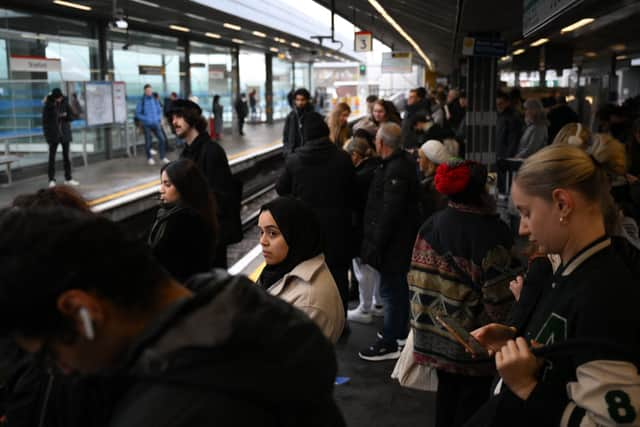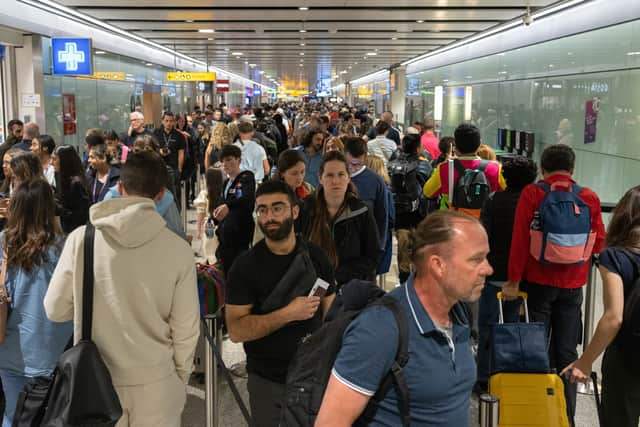Christmas Eve travel chaos: advice for travelling by road, rail and air amid strike action on December 24
and live on Freeview channel 276
Millions of people flocking to see loved ones or embarking on getaways this Christmas face even more disruption than usual due to strike action. Both railway workers and Border Force staff are set to strike over Christmas, likely leading to long queues at airports, cancelled trains and delays on major motorways.
Around half of those affected by the train strikes are set to drive or get a lift to their destination instead, with 16.6 million people expected to take to the roads on December 24. Meanwhile, most train services are expected to finish early on Christmas Eve and long queues are expected at airports arrivals as military personnel are drafted in to check passports.
Advertisement
Hide AdAdvertisement
Hide AdMany people, especially those travelling by train, have been warned to travel on Christmas Eve only if absolutely necessary. Here’s everything you need to know including some handy tips to get to where you need to be safely.
Travelling by train - last time to catch a train on Christmas eve during the rail strikes
Thousands of railway workers from the Rail, Maritime and Transport Union (RMT) are set to strike from Christmas Eve (Saturday, December 24) until 6am on December 27. This means trains on December 23 and Christmas Eve will be even busier than usual, and the majority of services will finish early on December 24.
As a result, passengers are being urged only to travel on Christmas Eve “if absolutely necessary,” and check the final train times for their journey area. Trains will stop running at around 3pm on Christmas Eve in most locations.


Examples of some earlier last train departure times include 10.45am from Leeds to London, 11am from London to Edinburgh and 12.48pm from London to Manchester. To check train times, visit the National Rail Enquiries website.
Advertisement
Hide AdAdvertisement
Hide AdTravelling by car - which roads will be busiest on Christmas Eve?
The AA said it expected around 16.9 million road journeys to be made across the UK on Friday, December 23, with a further 16.6 million on Christmas Eve. Industrial action by railway workers are set to make traffic jams worse, with an RAC survey revealing that half of people affected by rail strikes plan to drive instead or get a lift from someone else.
Drivers on some stretches of motorway including the M25, the M5 between Bristol and Weston-Super-Mare and the M6 around Birmingham have been warned to expect delays in particular. In addition, stretches of the M1 ‘smart’ motorway from Luton northwards often suffer congestion from incidents or breakdowns, as well as the M62 and M60 in the North West. Both the M4 and the M27 are also expected to suffer from significant delays.
Edmund King, AA president, said: “Many breakdowns are preventable, so checking your vehicle before you set off is very important. Tyres (including the spare, if you have one), fuel, EV range, oil levels, coolant and screen wash checks should be made as a minimum.
“Likewise keeping water, high protein food or chocolate, warm clothes, coats and a hi-viz jacket will help keep you going should the worst happen.”
Advertisement
Hide AdAdvertisement
Hide AdTravelling by air - which airports are affected by the Border Force strikes?
Around 1,000 members of the Public and Commercial Services (PCS) union who work operating passport booths for Border Force are set to work out of the following airport on Friday, December 23:
- London Heathrow
- Birmingham
- Cardiff
- London Gatwick
- Glasgow
- Manchester
More than 250,000 passengers arriving at UK airports on Friday, December 23 have been warned to expect delays due to strikes, and it means Christmas Eve could be even busier than usual.
Strikes by Border Force staff will be held every day from Friday to the end of the year, except December 27. Military personnel and volunteers from the Civil Service have been trained to check passports in preparation for the industrial action.


In preparation for the industrial action, military personnel and volunteers from the Civil Service have been trained to check passports. But there are concerns the contingency workers will be less efficient in these roles than striking Border Force officials, which could result in long queues and even planes failing to take off on time.
For more information and travel tips, visit the gov.uk website.
